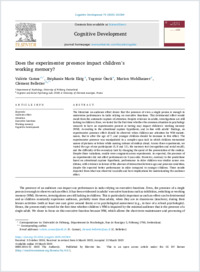Does the experimenter presence impact children’s working memory?
PSPE
- Camos, Valérie Department of Psychology, University of Fribourg, Switzerland
- Mariz Elsig, Stéphanie Department of Psychology, University of Fribourg, Switzerland
- Öncü, Yagmur Department of Psychology, University of Fribourg, Switzerland
- Wohlhauser, Marion Department of Psychology, University of Fribourg, Switzerland
- Belletier, Clément Cognitive and Social Psychology Lab, CNRS & University of Clermont Auvergne, France
- 2025
Published in:
- Cognitive Development. - Elsevier BV. - 2025, vol. 74, p. 1-16
English
The literature on audience effect shows that the presence of even a single person is enough to undermine performance in tasks relying on executive functions. This detrimental effect would result from the automatic capture of attention. Despite evidence in adults, investigations are still lacking in children. Here, we tested for the first time whether the common situation in psychology research to have an experimenter present at testing may impact children’s working memory (WM). According to the attentional capture hypothesis, and in line with adults’ findings, an experimenter presence effect should be observed when children use attention for WM maintenance, that is after the age of 7, and younger children should be immune to this effect. The experimenter presence was manipulated in a complex span task in which children memorized names of pictures or letters while naming colours of smileys aloud. Across three experiments, we varied the age of our participants (5, 8 and 11), the memory test (recognition and serial recall), and the difficulty of the secondary task by changing the speed of the presentation of the smileys. Despite these variations, results were congruent across experiments. As expected, the presence of an experimenter did not affect performance in 5-year-olds. However, contrary to the predictions based on attentional capture hypothesis, performance in older children was similar across conditions, with evidence in favour of the absence of interaction between age and presence condition, despite the expected better performance in older compared to younger children. These results departed from what was observed in adults and have implications for understanding the audience effect.
- Faculty
- Faculté des lettres et des sciences humaines
- Department
- Département de Psychologie
- Language
-
- English
- Classification
- Psychology
- License
- Open access status
- hybrid
- Identifiers
-
- DOI 10.1016/j.cogdev.2025.101569
- ISSN 0885-2014
- Persistent URL
- https://folia.unifr.ch/unifr/documents/331337
Statistics
Document views: 44
File downloads:
- camosetal25: 94
